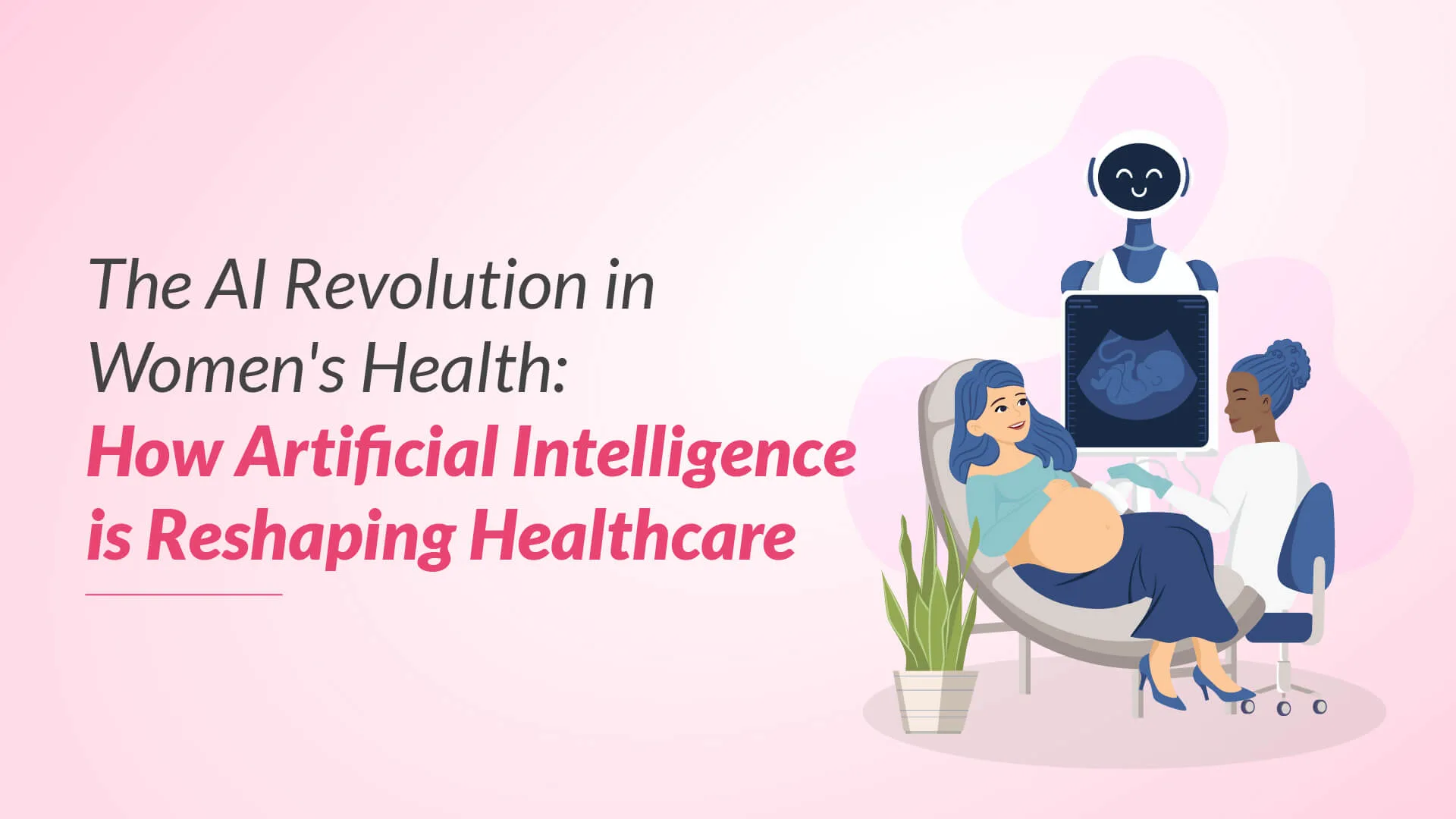Integrating artificial intelligence (AI) into the healthcare sector has been a game-changer, particularly in women’s health. This cutting-edge technology is revolutionising how doctors approach various aspects of female healthcare, from early detection & diagnosis to personalised treatment plans and predictive analytics. This innovative approach holds immense promise in enhancing the quality of care & improving outcomes for women worldwide.
Find Hope and Solutions for Female Infertility and Male Infertility — Explore Our Comprehensive Services
IUI Treatment
ICSI Treatment
PICSI Treatment
Fertility Preservation Service
Blastocyst Culture & Transfer Treatment
Genetic Screening & Testing
Role of Artificial Intelligence in Healthcare
Artificial intelligence has become an asset in the healthcare industry, offering numerous applications that transform how doctors approach patient care. Here are some key areas where AI is making a significant impact:
AI in Breast Cancer Screening
Early detection is crucial in the fight against breast cancer, and AI plays a vital role in this endeavour. Machine learning algorithms can accurately analyse mammograms, identifying potential abnormalities that human radiologists may have missed. This technology improves the detection rate and reduces the risk of false positives, minimising unnecessary biopsies and alleviating patient anxiety.
AI for Cervical and Ovarian Cancer
AI is also proving invaluable in detecting and diagnosing cervical and ovarian cancers. By analysing medical images, such as Pap smears and ultrasound scans, AI algorithms can identify patterns and irregularities that may indicate the presence of these cancers. This technology can significantly improve early detection rates, leading to more effective treatment outcomes for women.
Suggested Read: Fertility Preservation Options For Cancer Patients
Tailoring Treatments with AI
AI is not limited to diagnostics; it also tailors treatments to the needs of individual patients. By analysing a patient’s medical history, genetic profile, and other relevant data, AI algorithms can recommend personalised treatment plans that consider each individual’s unique characteristics. This approach increases the successful treatment rates and minimises the risk of adverse side effects.
AI-Driven Predictive Analytics
Predictive analytics powered by AI is revolutionising how doctors approach disease management. By analysing vast data, including medical records, lifestyle factors, and environmental conditions, AI algorithms recognise patterns and predict the likelihood of developing certain conditions. This information can be invaluable in implementing preventive measures and early interventions, potentially reducing the burden of chronic diseases on women’s health.
AI in Fertility Tracking
AI-powered fertility tracking apps and devices have become invaluable tools for women seeking to conceive. These technologies can evaluate factors, such as basal body temperature, hormonal levels, and menstrual cycles, to predict ovulation and identify the optimal time for conception. Additionally, AI can provide personalised recommendations for lifestyle changes and fertility treatments, increasing the chances of a successful pregnancy.
Pregnancy Monitoring and Management
AI is also making significant strides in pregnancy monitoring and management. By analysing data from wearable devices & other sources, AI algorithms can detect potential complications early, allowing timely interventions. Furthermore, AI-powered virtual assistants can provide expectant mothers with personalised advice & support throughout their pregnancy journey, addressing concerns and promoting overall well-being.
AI in Mental Health Care for Women
Mental health is an integral aspect of women’s overall well-being, and AI is increasingly important in this area. Chatbots and virtual therapists powered by AI can provide accessible and confidential support for women struggling with anxiety, depression, and postpartum disorders. Additionally, AI algorithms can analyse data from wearable devices and social media interactions to identify potential mental health concerns, enabling early intervention and appropriate care.
Ensuring Patient Data Security
As the use of AI in healthcare grows, ensuring patient data security becomes paramount. AI algorithms rely on sensitive medical data. Therefore, robust security measures should be incorporated to protect this information from misuse. Doctors must implement stringent data protection protocols, including encryption, access controls, and regular security audits, to maintain the trust and privacy of their patients.
Challenges of AI in Women’s Health
While the potential benefits of AI in women’s health are undeniable, several challenges need to be addressed:
Data Bias and Representation
One of the concerns surrounding AI in healthcare is data bias. The resulting models may perpetuate existing biases and inequalities if the datasets used to train AI algorithms do not represent diverse populations.
Data Privacy and Security Concerns
AI systems rely heavily on patient data, and legitimate concerns about data privacy and security exist. Doctors must implement robust data protection protocols to safeguard sensitive patient information.
Integration with Existing Healthcare Systems
Integrating AI technologies into existing healthcare systems can be a complex and challenging process. Doctors must ensure that AI solutions are integrated with electronic health records (EHRs), clinical workflows, and other critical systems to maximise their effectiveness and minimise disruptions to patient care.
Lack of Clinical Validation
While AI has shown promising results in various healthcare applications, there is still a need for rigorous clinical validation to ensure the accuracy and reliability of AI-driven decisions.
Access and Equity Concerns
Adopting AI in healthcare may exacerbate existing disparities in access to quality care if not implemented equitably. AI-driven solutions should be accessible and affordable to all women, regardless of social status, economic status and geographic location. Failure to address these equity concerns could further widen the gap in healthcare outcomes for underserved populations.
Ongoing Maintenance and Updates
AI systems are not static; they require ongoing maintenance, updates, and retraining to remain accurate and effective. Doctors must be prepared to allocate resources for continuously monitoring and updating AI models to ensure they remain relevant and reliable as new data and insights become available.
Emerging AI Technologies and Healthcare Innovations
Innovative technologies that hold even greater potential for transforming women’s healthcare are emerging. Some of the most promising areas include:
- Conversational AI: Chatbots & virtual assistants powered by natural language processing (NLP) and machine learning can provide personalised advice, support, and even therapy for women’s health issues, increasing accessibility and convenience.
- AI-Powered Wearables: Wearable devices integrated with AI can continuously monitor vital signs, track menstrual cycles, and provide real-time insights into a woman’s health, enabling proactive interventions and personalised care.
- Precision Medicine: By combining AI with genomics and other omics data, precision medicine can tailor treatments to an individual’s unique genetic profile, maximising efficacy and minimising adverse effects.
- AI-driven Drug Discovery: AI algorithms can accelerate the process of drug discovery & development by identifying potential drug candidates, predicting their efficacy, and optimising clinical trials, ultimately leading to more effective and targeted treatments for women’s health conditions.
Conclusion
The AI revolution in women’s health is well-advanced, and its impact is already being felt across various aspects of healthcare. From early detection & diagnosis to personalised treatment plans and predictive analytics, AI empowers doctors and women with powerful tools to improve outcomes and enhance overall well-being. However, it is essential to mitigate the challenges posed by AI, such as data bias, privacy concerns, and equitable access, to ensure that this technology benefits all women, regardless of their background or socioeconomic status.




























